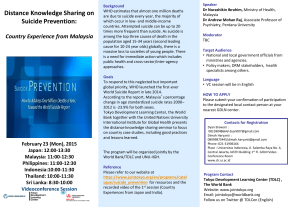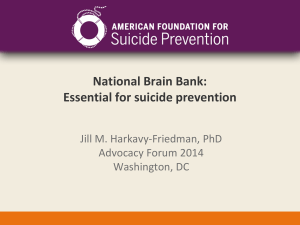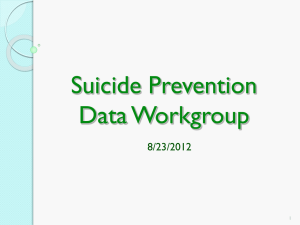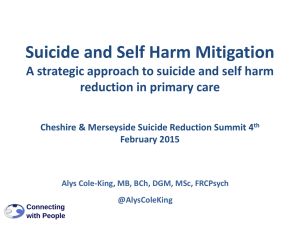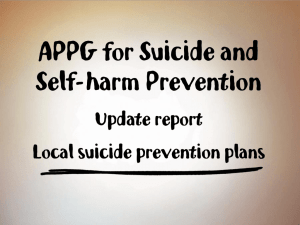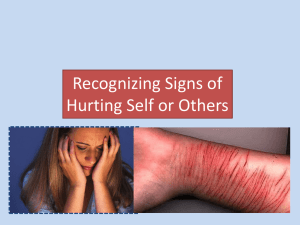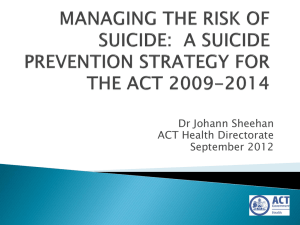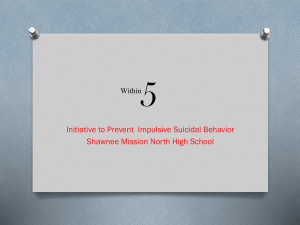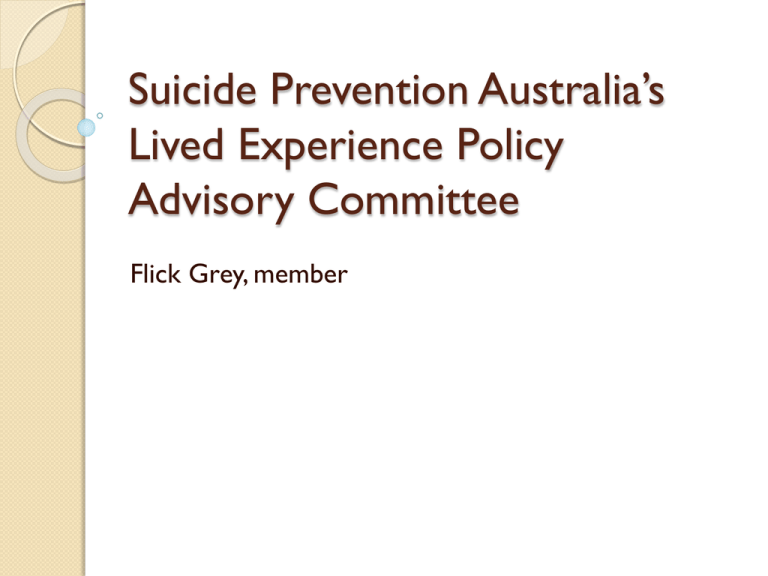
Suicide Prevention Australia’s
Lived Experience Policy
Advisory Committee
Flick Grey, member
Suicide Prevention Australia (SPA):
some background
History: began in 1992 as a voice for
small number of individuals and
organisations committed to suicide
prevention and bereavement support
Today is the national peak body for the
suicide prevention sector; broad based
Vision: “a world without suicide”
Mission: “to make suicide prevention
everybody’s business”
3 of SPA’s 9 principles for suicide
prevention
1.
2.
3.
“Suicide and suicidal behaviour arise from
complex social, situational, biological and
other individual causes …”
“Suicide prevention is ‘everyone’s business’
…”
“The first person voices of those with lived
experience of suicide are crucial to
increasing understanding of suicide and
effective suicide prevention responses.”
The case for a Lived Experience
committee
“The experience, knowledge and expertise
of people with lived experience of suicide
has the capacity to inform and generate
improved policy, service delivery and
outcomes for suicide prevention across
Australia. Principles underlying this include:
◦ The right of people who are impacted by policy
to have input into its design;
◦ The value to policy and practice of the unique
knowledge and perspectives of people who have
life experiences.”
Selection process
Lived experience of suicide, self-defined, including
but is not limited to:
◦
◦
◦
◦
◦
◦
Those who have survived a suicide attempt
Those who have previously been suicidal
Those who have self-harmed
Those who have been bereaved by suicide
Those who have cared for a suicidal person
Those who have been personally impacted by the suicide
or attempted suicide of another.
Self-nominated
Selection: by SPA and an independent adjudicator,
“according to their knowledge, willingness and ability
to contribute to the objectives of the committee.”
Snapshot of members
110+ applications, 11 members selected
Includes people who have themselves attempted
suicide; people bereaved by suicide of loved ones
and carers of people who have been suicidal
(many of us are in multiple positions!)
Ages range from early 20s to “old”
Geographically dispersed
People who have set up NGOs, who work or
volunteer in the sector, have management
backgrounds, psych training, and many who don’t
Diverse but not “representative”
My own positionality
Resource Co-ordinator at Our Consumer Place
(OCP) – working with Merinda Epstein
◦ a resource centre run entirely by people with a lived
experience of ‘mental illness’ (consumers)
◦ critical value of lived experience and consumer
leadership
◦ Expert Reference Group on Borderline Personality
Disorder
Multiple suicide attempts & chronic suicidality
Volunteer Lifeline TCS
Bereaved by a close friend who suicided last year
The function and role of the
committee
Diversity of expertise, rather than “representative”
Well-resourced:
◦ both in terms of expertise and passion from the group
◦ and the capacity of SPA to provide support
Two-way initiative:
◦ issues and opportunities to be identified by SPA
◦ or by committee members,
◦ for the attention of SPA or the committee
Our own meetings + reviewing SPA materials + speaking on
behalf of SPA + providing advice to partner organisations
No remuneration, but reimbursement for out-of-pocket
expenses
Our first meeting
Introduced ourselves
Meeting bi-monthly: initially 3 monthly
Discussion topics:
◦ Name and scope of the committee
◦ Missing perspectives and how to address
(“representation”)
◦ Upcoming networking opportunities for us
to network with each other
◦ Suicide/self-harm: discussed complex
relationship between suicide and self-harm
Where to from here?
Energy and scope for more than
minimal participation (original conception
of quarterly meetings)
Evolution expected: objectives kept
broad so that the committee can evolve
… Our future is unknown!


